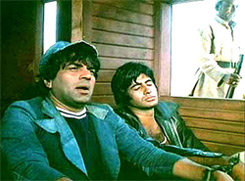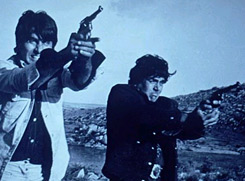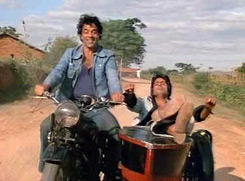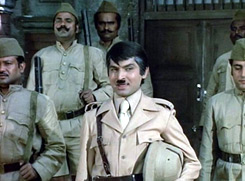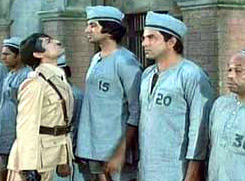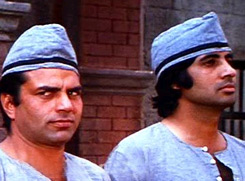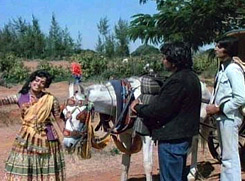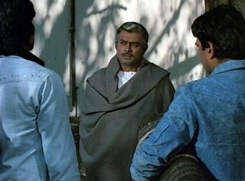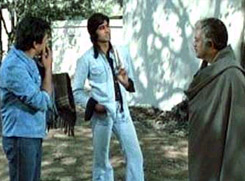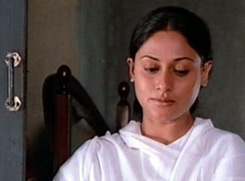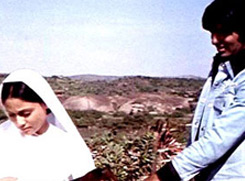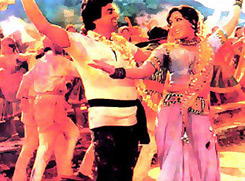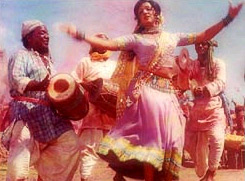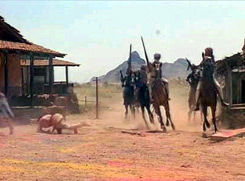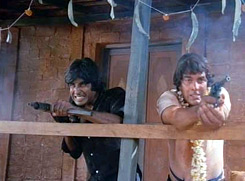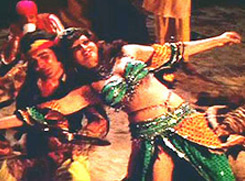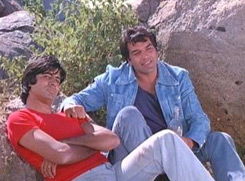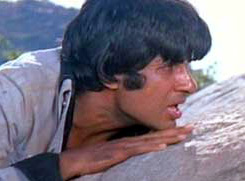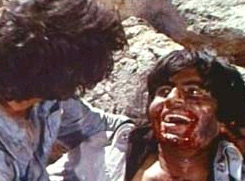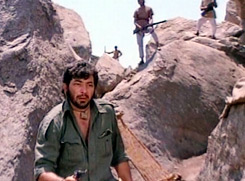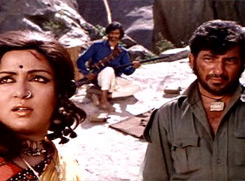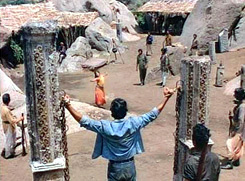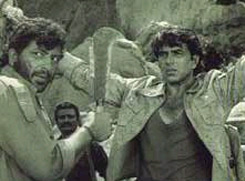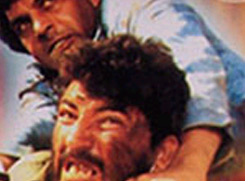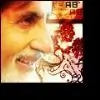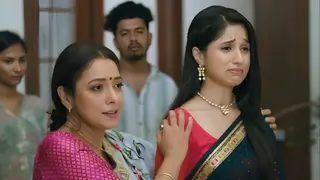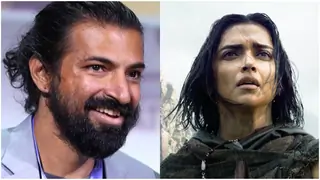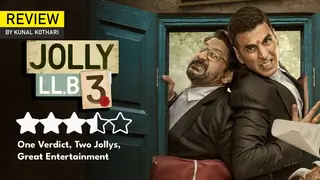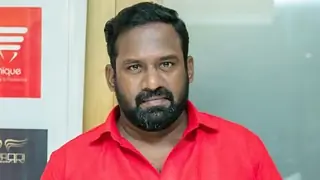Amar, Akbar, Anthony, Manmohan Desai's 1977 movie takes the separated-at-birth, double role device prevalent in many Hindi movies over the years and puts a twist on it.
The set-up is this: driver Kishenlal (played by Pran), just home from having taken the fall for his boss, Robert, and gone to jail, finds his three small sons starving and his wife, Bharti, ill with TB. Enfuriated that Robert has not kept his word to support the family financially, the father sets off to confront him.
While he's gone, the long-suffering Bharati (Nirupa Roy, who else?), pens a suicide note, leaves it with the boys, and runs off to do herself in, so as not to be a burden to the family. Over at Robert's palatial home, he and Kishenlal have a showdown and a shootout, and Kishenlal escapes in a car that, unbeknownst to him, contains gold bricks (albeit some very light ones). Upon finding his baby sons and the note, he piles the kids into the car, and zooms off, Robert's men in pursuit, to look for the missus. He stops briefly to deposit them at the foot of a statue of Gandhi, telling them to stay put. The baddies find and chase him. He crashes, police and crooks think he's dead, but, he's actually escaped with a box of those ultra-lite gold briquettes. Meanwhile, in another part of the forest, Bharati runs to her designated suicide spot, but before she can reach wherever it is, a tree branch falls on her, and PLAF! she's suddenly rendered blind.
(You with me so far?)
So, we have one father - Kishenlal - in hiding, one mother - Bharati - blind and home to an empty house, and the three babies, what happens to them? One wanders to the road in search of food and is hit by a car and injured, and rescued by the police. He is raised as Amar. Another lands up at the door of a church and is taken in by a priest. He is raised as Anthony. The smallest is found alone and crying by the Gandhi statue, and taken home by a Muslim tailor. This is Akbar.
Fast forward to the present. Akbar (Rishi Kapoor) is a qawwali singer and friend of Anthony (Amitabh Bachchan), who's a bit of a chancer, running a small bar and giving 50% of his earnings to the poor. Amar (Vinod Khanna) has become a police officer. By a series of circumstances, before the opening credits have yet to roll, Bharati is in the hospital in need of a tranfusion for her rare blood type, and lo and behold, the 3 guys just happen to be there and match, but of course, no one realizes that they're all related.
As with Deewar and Zanjeer, Amitabh Bachchan's wardrobe is fantastically trendy in this film. In one scene, he appears in a red leather jacket, and bell-bottom jeans with a patch, the ubiquitous '70s decoration, two fingers making a peace sign in the red, white and blue stars and stripes of the American flag, topped off with a floppy newsboy cap. He dons a different color cap in another scene, and also rotates his jewelry between an oversize ankh (how Valley of the Dolls!) on a silver chain around his neck, or a cross large enough to belong to a bishop.
Not to be outdone, Rishi Kapoor, the Qawwali King, shows up in one scene for his concert wearing purple trousers, a mesh wife beater (or cut banyan, depending on from whence you hail) topped off by a see-thru green shirt, lavender scarf and oversize sunglasses.
For the sold-out qawwali concert (where we hear the song Pardah Hai Pardah), upon bumping into the blind and ticketless Bharati who's come to hear Akbar and give him a flower, Anthony behaves like the perfect son and tells her that he has a special pass to get them in, and once in the hall "You sit on my seat and I'll sit at your feet." Hai rabba. With celluloid sons like this, Indian kids in real life have got a lot to live up to.
The three brothers find three equally cute girlfriends. Akbar's is Salma, a fetching Muslim doctor (played by Neetu Singh) whose father disapproves of his daughter's choice of suitor, though he's eventually won over, not by the hijras who serenade him, but after Akbar saves him and Salma from a fire. Amar falls for Laxmi, a woman suspect (played by Shabana Azmi) who he's been sent undercover to tail, as she's been implicated in some hitchhikings-cum-robberies. When we first catch a glimpse of her, she's poised by the roadside, looking very comely in oversize yellow flares and a matching green, yellow and black blouse. It turns out Laxmi has been committing the crimes, but only because she was forced to.
The relationship that gets the most screen time is that of Anthony and Jenny (played by Parveen Babi), and the reason for that is because, just to add more twists to the plot, Jenny is actually the daughter of Robert, but she was kidnapped as a baby by Kishenlal, for revenge of the loss of his sons, and raised by him. Anthony sees her for the first time at St. Mary's church in Bandra, where she has come to attend Mass, beautifully groomed in a pale yellow, tiered dress and black lace mantilla (this was back when women used to still cover their heads inside a church). She has returned from overseas for a visit and Kishenlal has assigned her a leering, beefy goofball of a bodyguard named Zebesko, who soon decides he'd like to guard Jenny's body full-time as her husband. Perhaps because of the atrocious poncho he wears in one scene, or because of his eerie resemblance to Son of Sam killer David Berkowitz, Jenny is repelled and rebuffs him.
One of the best scenes and songs in Amar, Akbar, Anthony takes place at the Easter Dance Jenny attends with Zebesko in tow, where a giant egg is rolled onto the dance floor and Amitabh Bachchan pops out, wearing a squishy stovepipe hat and tuxedo, and procedes to sing the almost totally nonsensical, but catchy, mambo: My Name is Anthony Gonsalves. In between the lyrics (sung by Kishore Kumar) he spouts phrases like "Wait, wait, WAIT! You see the whole country of the system is juxtapositioned by the hemoglobin in the atmosphere because you are a sophisticated rhetorician intoxicated by the exuberence of your own verbosity!" For days after watching this movie, I couldn't get that song out of my head.
There are many other memorable scenes, including the drunk scene AB does, talking to his mirror twin after a brawl, dabbing medicine on the other guy's wounds, and another where he shows up at the church in a three-piece white suit and pink tie ready to get married only to find the priest who raised him murdered, and he angrily addresses a statue of Jesus (much like Vijay in Deewar at the temple as he was dying) saying "Tell me the name of who did this or I'll become so bad" (of course, just then a locket - containing the clue - drops from the dead priest's hand).
Invariably, the various strands of the story criss-cross each other, with a miraculous religious eyesight healing (hey, I guess this precedent is why the makers of Fanaa figured they could get away with it) ending up with the Big Climactic Scene with all three brothers (in costume, and singing), all three girlfriends, one villian, one wronged father, and a score of bad guys, out at Robert's house, which looks like Hernando's Hideaway, or a hotel I stayed at once in Puerto Vallarta.
See it or skip it?
You must see it! In addition to the sweet notion of the film, that inspite of religious beliefs we are all brothers and should all get along, the movie just has a terrific, happy-go-lucky feel to it, and between the songs, the crazy storyline, the fab costumes and the attractive triumvirate of heros and their accompanying heroines, what's not to like?
![]() Tum Gabbar Singh ko nahin maaroge! Tum yahan Gabbar ko pakarke mere hawaale karne aaye ho. Zinda!
Tum Gabbar Singh ko nahin maaroge! Tum yahan Gabbar ko pakarke mere hawaale karne aaye ho. Zinda!![]() Thakur
Thakur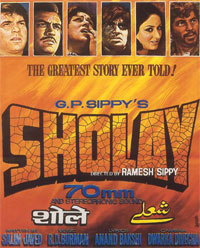
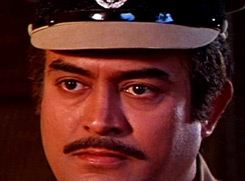 A train arrives at a rural station and a lone police officer disembarks, looking for "Thakur Sahib" (thakur, literally "lord, master," is a respectful title for a member of one of the landlord castes who trace their lineage to ancient kshatriyas or warrior-aristocrats; Sahib means "sir"). As the credits roll, we follow his horseback journey through a Badlands-like landscape to the remote settlement of Ramgarh ("Rama's fort"). Here he meets the Thakur, Baldev Singh (Sanjeev Kumar), a retired police officer who is always wrapped in a gray shawl. Singh requests his visitor to locate and bring him two criminals, the scruffy, ever-smiling Veeru (Dharmendra) and the lanky, brooding Jaidev or "Jai" for short (Amitabh Bacchan).
A train arrives at a rural station and a lone police officer disembarks, looking for "Thakur Sahib" (thakur, literally "lord, master," is a respectful title for a member of one of the landlord castes who trace their lineage to ancient kshatriyas or warrior-aristocrats; Sahib means "sir"). As the credits roll, we follow his horseback journey through a Badlands-like landscape to the remote settlement of Ramgarh ("Rama's fort"). Here he meets the Thakur, Baldev Singh (Sanjeev Kumar), a retired police officer who is always wrapped in a gray shawl. Singh requests his visitor to locate and bring him two criminals, the scruffy, ever-smiling Veeru (Dharmendra) and the lanky, brooding Jaidev or "Jai" for short (Amitabh Bacchan). 